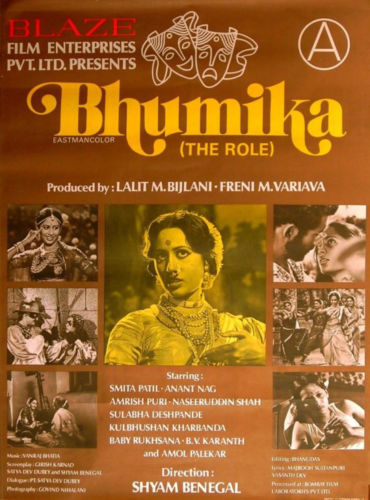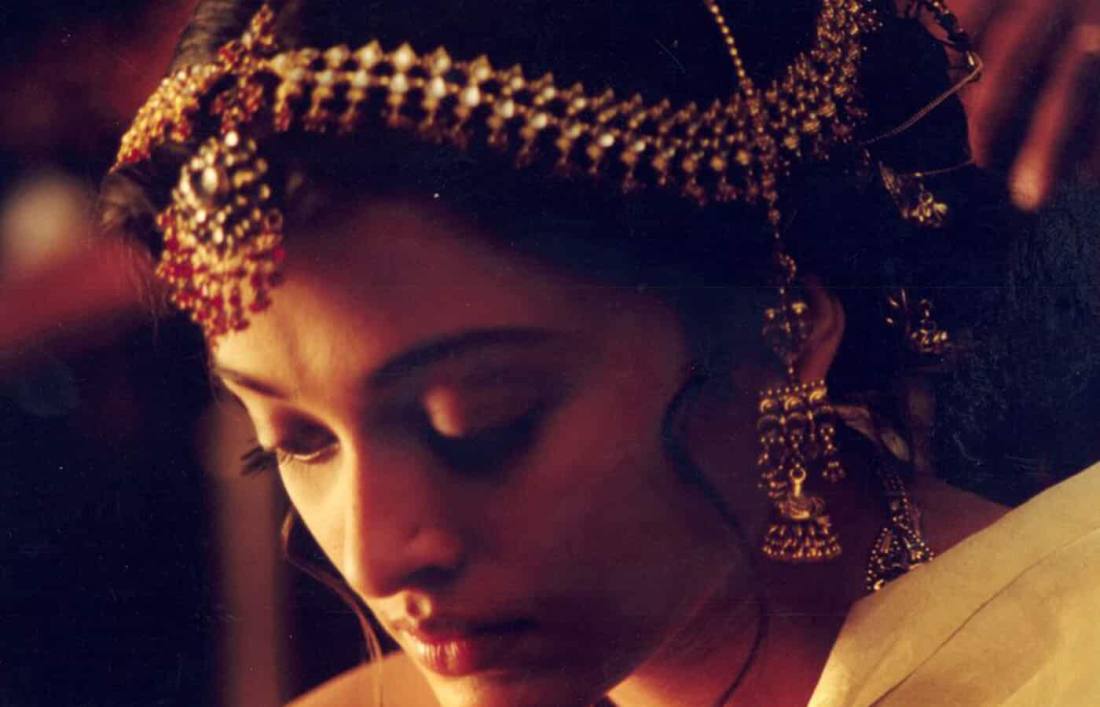CHOKHER BALI(2003)
CAST: AISHWARYA RAI, PROSENJIT CHATTERJEE, RAIMA SEN, TOTA ROY CHOWDHARY, TINA DUTTA, SUDESHNA ROY and LILY CHAKRAVARTY.
DIRECTION: RITUPARNO GHOSH.

**
It has always been my conscious belief that every prevalent work of art is buffeted by winds of social change. One of the first films I wrote about, here on my blog, was Shyam Benegal’s global landmark BHUMIKA(THE ROLE, 1977) ; it is interesting to note that lead protagonist Usha’s( iconic Smita Patil) choices and idiosyncrasies portrayed in her relationships with men was a direct distillation of the neo-feminist movement in the 1970s which was rearing its head out of the subaltern discourse and emerging on the mainstream platform. This was in keeping with the contemporary era in which it released irrespective of the fact that the film’s timeline was of the 1940s-50s.


Satyajit Ray’s DEVI(THE GODDESS,1960) too was modelled around this contentious battle of wits between a particularly bucolic and generally entrenched brand of religious fanaticism in the 19th Century running parallel to an emancipated worldview occasioned by English education, Bhramo Samaj and social reformation in colonial Bengal.
**
Then comes CHOKHER BALI (2003), a movie adaptation of Rabindranath Tagore’s early 20th century novel. Tagore had never put his stamp on being a hard-boiled reformer or activist but stood to represent the foundation of an order “where the mind is without fear” thus chalking out stirring tales and poetry way ahead of his time. In their own individual way, his works predate feminism, liberalization and the urban myth of gender equality we’ve been chasing to no avail even to this day. CHOKHER BALI similarly triumphs in subverting status quo and implementing the graph of human endeavours with characteristic frankness and fervour. I personally feel that a work like this or several of Tagore’s works have simply no match well in the present day of ‘modern values’
**
Of course, the idea of an adaptation comes with a flipside as every good film made on these lines goes like a profound piece of literature but every book to movie translation necessarily doesn’t hold water. Tagore’s novel went where no other work had wandered before- a space rooted in conservative adages. Here morality existed chiefly as a means for adherence to closed mindsets and widening the man-woman rift. CHOKHER BALI had the courage to upend trite conventions and fortunately its screen revision is iconoclastic and original in tone.



Director RITUPARNO GHOSH has been a beacon of Bengali cinema’s brilliance in form and content much like Satyajit Ray’s heyday. He furnishes the period element of this film with a passion play rich in sensuous frames and interpersonal relationships, deepening Tagore’s impact on millennials while tracing its early 20th century ethos. Ghosh takes Tagore’s lead and ups the ante for Aishwarya Rai’s turn as widow Binodini. The crux of the tale lies in her plight. However, the depiction here is surprisingly liberal and a marked departure from the hush-hush, wink-wink attitudes reserved for them. This iconography of society’s compassionate and open nature is a positive token of the Bengali bhadralok (educated middle classes), illustrated in individual outlooks of women and menfolk in this screenplay.
**
For a long time, widows have bore the brunt of ill-will and subsisted on islands of pain, drawing water from the well of conspicuous silence and voiceless meanderings to exist on absolute fringes. Cinema has exploited this reserve for its own unhealthy self-fulfillment in toying with mechanics of tragedy; which is why for Tagore to envision such an important change and portray them as flesh and blood individuals amidst equally concerned kindred is a crowning achievement. That said, all characters here shine with the twilight shade of complexities. They are grey personages to reckon with, refusing to let ways of the world dictate their needs, mores or ethical codes.
Binodini is an exceptionally educated, talented and intellectual young woman, trained in the English language, piano and poetry, possessing a mind of her own. Her presence is never an aberration or considered to be ‘a jinx’ and she is shown to mingle with her relatives and well-wishers and prevail as one of their own. This is where the unusual flavour of the script is tapped to eke out females who are more than the sum total of their broken parts. Mass hysteria pronounced on the part of victimisation of widowhood in traditional circles is shut out in favour of a kaleidoscopic gallery of emotional turbulences.


The Oscar nominated WATER (2005) by celebrated filmmaker Deepa Mehta has already made us privy to tragic underpinnings and sexual upheavals of the subject with melancholic depth, probing cultural precepts like no other ever since. Binodini’s status as a widow is incidental as it truly must be treated as and is a launchpad for giving birth to her own latent desires and sexual agency. It becomes easy for us then to empathize with and root for her even when she plants feet of clay, to get what she wants for the price of fulfillment. Her silver tongued wisdom is a particular trait adjunct with her luminous beauty. For the most part, Aishwarya Rai invests Binodini with intelligence and unabashed nerve to pull off the myriad hues of her personality. She is a complex figure and simultaneously becomes an object of art in the hands of cinematographer Aveek Mukhopadhyay. She is, however, never commodified or pigeonholed as a performer.
***
As beauty is shown to bow to some kind of self-destruction, Binodini’s wishes threaten to blow bugles of marital discord for her best friend Ashalata ( the always charming RAIMA SEN) when her husband Mahendra( superstar PROSENJIT CHATTERJEE) falls head over heels in love with the former, the girl he had rejected in a proposal earlier by just setting his eye on her photograph. It’s clear that for Mahendra, Binodini’s beauty isn’t an all-encompassing determinant. In her takes no prisoners spirit, he finds an equal who can physically and intellectually be on the same footing as opposed to the naive, innocent, semi-literate Ashalata. Her marital bliss with Mahendra gets evaporated as soon as the passion of this untimely intimacy gets stoked by her husband’s capricious behaviour. The girl, whom she had fondly nicknamed as Chokher Bali, ends up being pitted against her for her husband’s affections, leaving her cornered and helpless. It’s in the gradual realization of their circumstances that all three attempt to build bridges and conquer their worst fears to find security and stability, away from society’s protracted gaze.
Ghosh ensures no ideological stream limits his storytelling and to our satisfaction, a welcome dose of goodwill is found in Tota Roy Chowdhary’s tacit restraint as Behari, Mahendra’s best friend who gets sucked into the vortex of relationships.
The performances in this film are uniformly good and RAIMA SEN upstages AISHWARYA in several of their joint scenes. She is heartbreakingly vulnerable and stoic as Ashalata, the unsuspecting sweetheart and in the end fails to let her charms equal those of Binodini. That doesn’t make Binodini a temptress or Asha a plain victim. Judgemental recourses aren’t components of this film’s distinctive issues. Lily Chakravarty and Sudeshna Roy also get their fair share as senior prefects of a rapidly changing household’s affairs of the heart and mind.
The only quibbles are in the form of a prolonged runtime and the pace which falls way off the mark at few points. Technically, some of the best shots are composed in the veins of a Raja Ravi Verma painting, noteworthy being the one where Binodini playfully pushes Ashalata on a swing.
Like Tagore, Ghosh is spinning a timeless yarn on human resources in the face of societal expectations. His females aren’t holy cows nor vamps while the males abide by their strong values and still highlight their innate weaknesses. Ultimately, CHOKHER BALI is a fine example of cinematic sensibilities, finding urgency in the mangled states of its protagonists and the supporting cast.



*****
Also watch the beautifully evocative EPIC miniseries STORIES BY RABINDRANATH TAGORE now streaming on NETFLIX, especially the first three episodes based on CHOKHER BALI featuring RADHIKA APTE, BHANU UDAY, TARA ALISHA BERRY and SUMEET VYAS as BINODINI, MAHENDRA, ASHALATA and BEHARI respectively. It’s a gift for discerning cinephiles.


**